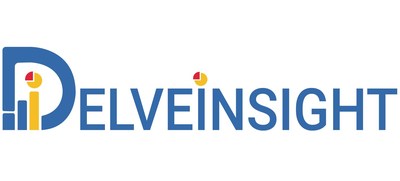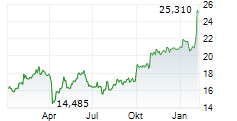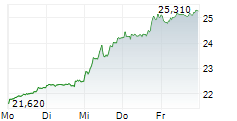
According to DelveInsight's analysis, the growth of the systemic sclerosis market is expected to be mainly driven by increasing prevalence, patient awareness, and the launch of potential therapies with novel mechanisms that are being investigated to improve the management of systemic sclerosis during the forecast period (2024-2034).
LAS VEGAS, June 27, 2024 /PRNewswire/ -- DelveInsight's Systemic Sclerosis Market Insights report includes a comprehensive understanding of current treatment practices, systemic sclerosis emerging drugs, market share of individual therapies, and current and forecasted market size from 2020 to 2034, segmented into 7MM [the United States, the EU4 (Germany, France, Italy, and Spain) and the United Kingdom, and Japan].

Key Takeaways from the Systemic Sclerosis Market Report
- According to DelveInsight's analysis, the market size for systemic sclerosis is expected to grow significantly by 2034.
- Systemic sclerosis usually appears in women aged 30-40, and it occurs in slightly older men. In approximately 85% of cases, systemic sclerosis develops in individuals aged 20-60 years.
- Leading systemic sclerosis companies such as Kyowa Hakko Kirin, AstraZeneca, Cabaletta Bio, Mitsubishi Tanabe Pharma, Genentech, Inc., Amgen, GlaxoSmithKline, Boehringer Ingelheim, and others are developing novel systemic sclerosis drugs that can be available in the systemic sclerosis market in the coming years.
- The promising systemic sclerosis therapies in the pipeline include Brodalumab, Anifrolumab, CABA-201, Inebilizumab, RO7303509, HZN-825, Belimumab, Avenciguat (BI 685509), and others.
- In March 2024, CABA-201 received an Orphan Drug Designation (ODD) for the treatment of systemic sclerosis. In addition, it has also been granted Fast Track Designation (FTD) by the US FDA in January 2024 for the same.
Discover which therapies are expected to grab the major systemic sclerosis market share @ Systemic Sclerosis Market Report
Systemic Sclerosis Overview
Systemic sclerosis, also known as scleroderma, is a chronic autoimmune disease characterized by the hardening and tightening of the skin and connective tissues. The condition arises due to the overproduction and accumulation of collagen in the skin and internal organs, leading to fibrosis. The exact cause of systemic sclerosis is not well understood, but it is believed to involve a combination of genetic predisposition and environmental factors, which trigger an abnormal immune response.
Symptoms of systemic sclerosis vary widely depending on the organs affected and the severity of the disease. Common symptoms include skin thickening and hardening, particularly on the fingers, hands, and face, Raynaud's phenomenon, and joint pain. As the disease progresses, it can affect internal organs, leading to complications such as esophageal dysfunction, pulmonary fibrosis, renal crisis, and heart issues.
Diagnosing systemic sclerosis involves a combination of clinical evaluation, laboratory tests, and imaging studies. A physical examination often reveals characteristic skin changes and blood tests may show specific autoantibodies, such as anti-centromere or anti-topoisomerase I (Scl-70) antibodies. Imaging techniques like high-resolution computed tomography (HRCT) of the lungs and echocardiography can assess the extent of internal organ involvement. A skin biopsy may also be performed to confirm the diagnosis by showing typical histopathological changes associated with the disease.
Systemic Sclerosis Epidemiology Segmentation
The systemic sclerosis epidemiology section provides insights into the historical and current systemic sclerosis patient pool and forecasted trends for the 7MM. It helps recognize the causes of current and forecasted patient trends by exploring numerous studies and views of key opinion leaders.
The systemic sclerosis market report proffers epidemiological analysis for the study period 2020-2034 in the 7MM segmented into:
- Total Diagnosed Prevalent Cases of Systemic Sclerosis
- Gender-specific cases of Systemic Sclerosis
- Age-specific cases of Systemic Sclerosis
- Type-specific cases of Systemic Sclerosis
- Severity-specific cases of Systemic Sclerosis
- Complications Associated with Systemic Sclerosis
Systemic Sclerosis Treatment Market
While no treatment has been shown to alter the overall progression of the disease, the therapy aims to address specific organ involvement early on to prevent irreversible damage, enhancing both quality of life and survival. Disease-modifying drugs can be recommended based on the clinical presentation and potential visceral damage. Special attention should be given to symptomatic drug treatments. Hematopoietic stem cell transplantation may be an option for patients with rapidly progressing systemic sclerosis who are at risk of organ failure, but it should only be performed at high-volume centers.
The treatment of systemic sclerosis is tailored to address specific manifestations such as skin, lung, gastric, heart, and kidney issues. Most therapies aim to treat the affected organs to prevent irreversible damage and to enhance both quality of life and survival. The primary manifestations of SSc are cutaneous and pulmonary and recommended treatments include Intravenous Cyclophosphamide, Methotrexate, Mycophenolate Mofetil, or Azathioprine. Cyclophosphamide is particularly prescribed for improving skin conditions in patients with SSc-associated interstitial lung disease.
For scleroderma pulmonary fibrosis, antifibrotic therapies like D-penicillamine, Esbriet (pirfenidone), and Ofev (nintedanib) are utilized. Raynaud's phenomenon (RP) and digital ulcers are commonly treated with calcium-channel blockers, phosphodiesterase 5 inhibitors, and angiotensin-converting enzyme inhibitors.
In cases of severe diffuse cutaneous SSc (dcSSc), autologous hematopoietic stem cell transplantation has been shown to improve patient survival, cutaneous symptoms, pulmonary involvement, and overall quality of life.
To know more about systemic sclerosis treatment guidelines, visit @ Systemic Sclerosis Management
Systemic Sclerosis Pipeline Therapies and Key Companies
Some of the drugs in the pipeline include Brodalumab (Kyowa Hakko Kirin), Anifrolumab (AstraZeneca), CABA-201 (Cabaletta Bio), and Inebilizumab (Mitsubishi Tanabe Pharma), among others.
Brodalumabis is an innovative monoclonal antibody that functions as an Interleukin 17 receptor antagonist, targeting the inflammatory cytokine pathway. It blocks Interleukin 17 interactions with cytokines IL-17A, IL-17F, IL-17C, IL-17A/F heterodimer, and IL-25. Kyowa Kirin submitted a supplemental New Drug Application (sNDA) to Japan's Ministry of Health, Labour and Welfare (MHLW) in December 2021, based on Phase III study results in Japanese patients with systemic sclerosis, characterized by moderate to severe skin sclerosis. In June 2022, the company presented the positive outcomes from this Phase III study at the EULAR (European Alliance of Associations for Rheumatology) 2022 Congress.
CABA-201, a fully human CD19-CAR T cell investigational therapy that includes a 4-1BB component, is engineered to deplete CD19-positive B cells deeply and temporarily after a single infusion. This approach aims to "reset" the immune system, potentially leading to long-term remission without ongoing therapy for patients with autoimmune diseases. In October 2023, the US FDA approved the IND application for CABA-201 for a Phase I/II study targeting systemic sclerosis. By March 2024, the drug was granted an Orphan Drug Designation (ODD) for systemic sclerosis treatment. Additionally, it received Fast Track Designation (FTD) from the US FDA in January 2024 for the same condition. The company has started a Phase I/II open-label study (RESET-SSc) of CABA-201 in systemic sclerosis patients, dividing participants into two parallel cohorts: six patients with severe skin involvement and six patients with pulmonary, cardiac, or renal involvement, regardless of skin condition.
The other therapies in the pipeline include
- RO7303509: Genentech, Inc.
- HZN-825: Amgen
- Belimumab: GlaxoSmithKline
- Avenciguat (BI 685509): Boehringer Ingelheim
The anticipated launch of these emerging therapies for systemic sclerosis are poised to transform the market landscape in the coming years. As these cutting-edge therapies continue to mature and gain regulatory approval, they are expected to reshape the systemic sclerosis market landscape, offering new standards of care and unlocking opportunities for medical innovation and economic growth.
Discover more about systemic sclerosis drugs in development @ Systemic Sclerosis Clinical Trials
Systemic Sclerosis Market Dynamics
The dynamics of the systemic sclerosis market are expected to change in the coming years. Based on the role of B cells and the published clinical data with CD19-CAR T therapy in systemic sclerosis, it is believed that CABA-201 may transform the treatment for systemic sclerosis. Kyowa Kirin submitted an sNDA for brodalumab in treating systemic sclerosis, and the launch of this drug will boost the systemic sclerosis market. Additionally, the development of a potential biomarker that allows for tracking and predicting the severity and potential progress of the disease, as well as the effectiveness of any therapeutic intervention, is crucial. Since pulmonary involvement is a leading cause of morbidity and mortality in systemic sclerosis, there is a need for more effective treatments that can stabilize or improve lung function and delay disease progression.
Furthermore, potential therapies are being investigated for the treatment of systemic sclerosis, and it is safe to predict that the treatment space will significantly impact the systemic sclerosis market during the forecast period. Moreover, the anticipated introduction of emerging therapies with improved efficacy and a further improvement in the diagnosis rate are expected to drive the growth of the systemic sclerosis market in the 7MM.
However several factors may impede the growth of the systemic sclerosis market. Only 35-50% of systemic sclerosis patients are eligible for current treatment, and while ERT has shown benefits mostly in kidney disease and reduction in left ventricular hypertrophy, it has not demonstrated dramatic improvement in outcomes for all organ systems. Additionally, reimbursement challenges, including limited coverage by healthcare payers or restrictive reimbursement policies, may limit patient access to expensive SSc therapies.
Moreover, systemic sclerosis treatment poses a significant economic burden and disrupts patients' overall well-being and QOL. Furthermore, the systemic sclerosis market growth may be offset by failures and discontinuation of emerging therapies, unaffordable pricing, market access, and a shortage of healthcare specialists. In addition, the undiagnosed, unreported cases and the unawareness about the disease may also impact the systemic sclerosis market growth.
Systemic Sclerosis Market Report Metrics | Details |
Study Period | 2020-2034 |
Coverage | 7MM [the United States, the EU4 (Germany, France, Italy, and Spain) and the United Kingdom, and Japan]. |
Key Systemic Sclerosis Companies | Kyowa Hakko Kirin, AstraZeneca, Cabaletta Bio, Mitsubishi Tanabe Pharma, Genentech, Inc., Amgen, GlaxoSmithKline, Boehringer Ingelheim, and others |
Key Pipeline Systemic Sclerosis Therapies | Brodalumab, Anifrolumab, CABA-201, Inebilizumab, RO7303509, HZN-825, Belimumab, Avenciguat (BI 685509), and others |
Scope of the Systemic Sclerosis Market Report
- Therapeutic Assessment: Systemic Sclerosis current marketed and emerging therapies
- Systemic Sclerosis Market Dynamics: Key Market Forecast Assumptions of Emerging Systemic Sclerosis Drugs and Market Outlook
- Competitive Intelligence Analysis: SWOT analysis and Market entry strategies
- Unmet Needs, KOL's views, Analyst's views, Systemic Sclerosis Market Access and Reimbursement
Download the report to understand which factors are driving systemic sclerosis market trends @ Systemic Sclerosis Market Trends
Table of Contents
1. | Systemic Sclerosis Key Insights |
2. | Systemic Sclerosis Report Introduction |
3. | Systemic Sclerosis Overview at a Glance |
4. | Systemic Sclerosis Executive Summary |
5 | Systemic Sclerosis Key Events |
6 | Epidemiology and Market Forecast Methodology |
6. | Disease Background and Overview |
7. | Systemic Sclerosis Treatment and Management |
8. | Systemic Sclerosis Guidelines |
9. | Systemic Sclerosis Epidemiology and Patient Population |
10. | Patient Journey |
11. | Key Endpoints in Systemic Sclerosis |
12. | Systemic Sclerosis Marketed Drugs |
13. | Systemic Sclerosis Emerging Drugs |
14. | 7MM Systemic Sclerosis Market Analysis |
15. | Market Access and Reimbursement |
16. | KOL Views |
17. | Unmet Needs |
18. | SWOT Analysis |
19. | Appendix |
20. | DelveInsight Capabilities |
21. | Disclaimer |
22. | About DelveInsight |
Related Reports
Systemic Sclerosis Epidemiology Forecast
Systemic Sclerosis Epidemiology Forecast - 2032 report delivers an in-depth understanding of the disease, historical and forecasted epidemiology as well as the systemic sclerosis epidemiology trends.
Systemic Sclerosis Pipeline
Systemic Sclerosis Pipeline Insight - 2024 report provides comprehensive insights about the pipeline landscape, pipeline drug profiles, including clinical and non-clinical stage products, and the key systemic sclerosis companies, including Eicos Sciences, Beijing Continent Pharmaceutical, Kyowa Kirin, Cytori therapeutics, Corbus Pharmaceuticals, Zenyaku Kogyo, Sanofi, Bayer, ASKA Pharmaceutical, Emerald Health Pharmaceuticals, United Therapeutics, Cumberland Pharmaceuticals, ILTOO Pharma, Horizon Pharmaceuticals, Janssen Biotech, Gesynta Pharma, Certa Therapeutics, Pfizer, Vicore Pharma, Seagen, CSL Behring, arGentis Pharmaceuticals, Mitsubishi Tanabe Pharma, Kadmon Pharmaceuticals, GlaxoSmithKline, Bristol-Myers Squibb, Camurus, Pfizer, Regeneron Pharmaceuticals, Regeneron Pharmaceuticals, Castle Creek Biosciences, Talaris Therapeutics, Viela Bio, Formation Biologics, Horizon Therapeutics, Chemomab therapeutics, AnaMar, Atlantic Healthcare, D&D Pharmatech, Acceleron Pharma, Riptide Bioscience, Timber Pharmaceuticals, Tvardi Therapeutics, Accuitis Pharmaceuticals, AKL Research and Development, iBio, Blade Therapeutics, Cantargia, BriaCell Therapeutics, Leadiant Biosciences, among others.
Diffuse Cutaneous Systemic Sclerosis Market
Diffuse Cutaneous Systemic Sclerosis Market Insights, Epidemiology, and Market Forecast - 2032 report deliver an in-depth understanding of the disease, historical and forecasted epidemiology, as well as the market trends, market drivers, market barriers, and key diffuse cutaneous systemic sclerosis companies, including Kadmon Corporation, Kyowa Kirin Co., Ltd., Gesynta Pharma AB, Acceleron Pharma Inc, Mitsubishi Tanabe Pharma Development, Emerald Health Pharmaceuticals, Cumberland Pharmaceuticals, Horizon Therapeutics Ireland DAC, CSL Behring, Seagen Inc., Janssen Pharmaceutical, Prometheus Biosciences, Inc., GlaxoSmithKline, Certa Therapeutics, among others.
Diffuse Cutaneous Systemic Sclerosis Pipeline
Diffuse Cutaneous Systemic Sclerosis Pipeline Insight - 2023 report provides comprehensive insights about the pipeline landscape, pipeline drug profiles, including clinical and non-clinical stage products, and the key diffuse cutaneous systemic sclerosis companies, including Kadmon Pharmaceuticals, Talaris Therapeutics, Horizon Therapeutics, Mitsubishi Tanabe Pharma, Takeda Oncology, Seagen, among others.
About DelveInsight
DelveInsight is a leading Business Consultant and Market Research firm focused exclusively on life sciences. It supports pharma companies by providing comprehensive end-to-end solutions to improve their performance. Get hassle-free access to all the healthcare and pharma market research reports through our subscription-based platform PharmDelve.
Contact Us
Shruti Thakur
info@delveinsight.com
+14699457679
www.delveinsight.com
Logo: https://mma.prnewswire.com/media/1082265/3528414/DelveInsight_Logo.jpg
![]() View original content:https://www.prnewswire.co.uk/news-releases/systemic-sclerosis-market-to-exhibit-significant-growth-by-2034-predicts-delveinsight--key-companies---kyowa-hakko-kirin-astrazeneca-mitsubishi-tanabe-pharma-genentech-amgen-glaxosmithkline-boehringer-ingelheim-302184052.html
View original content:https://www.prnewswire.co.uk/news-releases/systemic-sclerosis-market-to-exhibit-significant-growth-by-2034-predicts-delveinsight--key-companies---kyowa-hakko-kirin-astrazeneca-mitsubishi-tanabe-pharma-genentech-amgen-glaxosmithkline-boehringer-ingelheim-302184052.html




